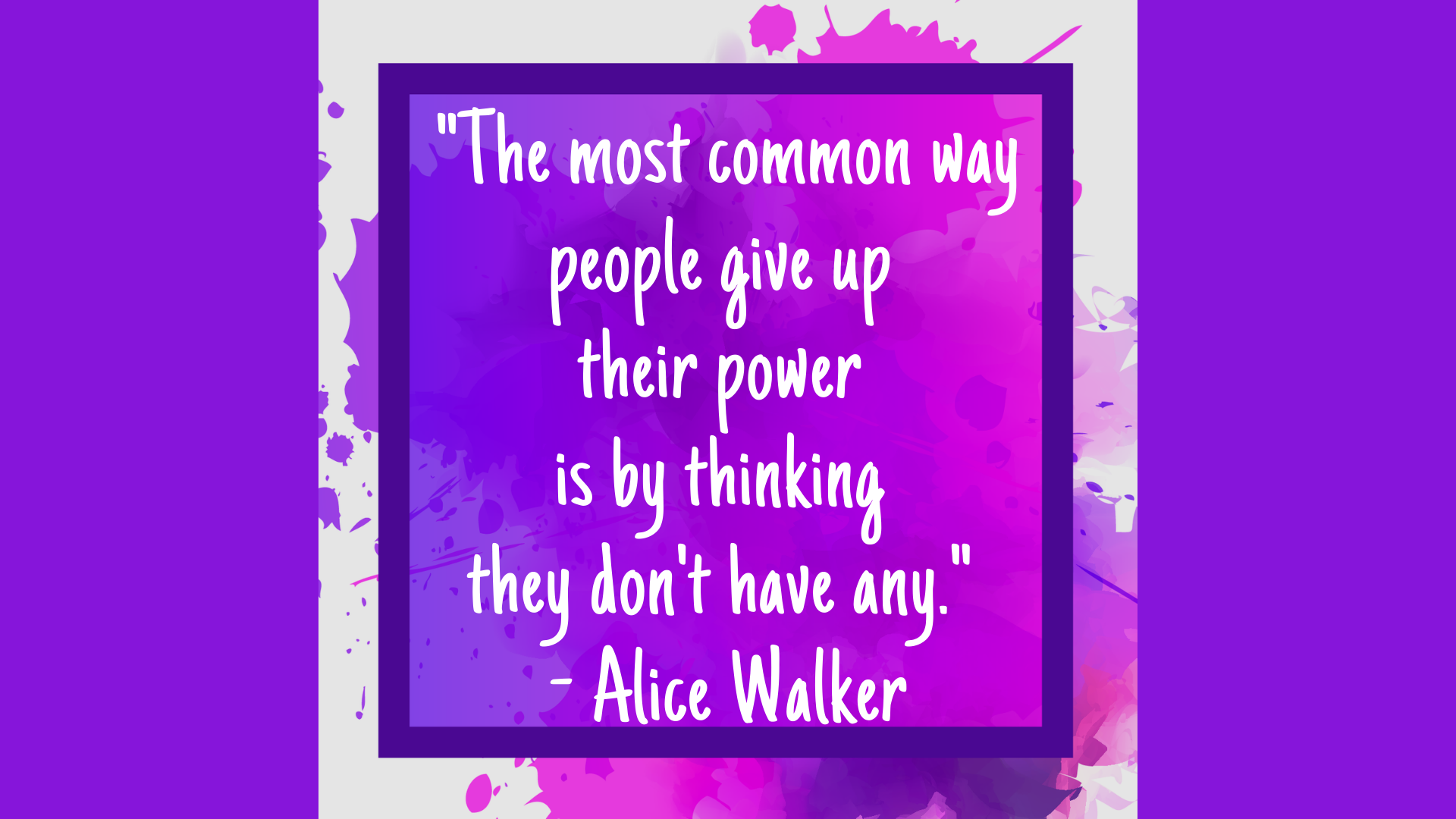Kay:
Heyo Questers we hope that you’re having a terrific Tuesday so far! It is May 18th. This is episode 357 and we have a dynamic quote for you today from a BA American novelist and short story writer. You may know her, the one and only Alice Walker.
Shi:
Author of “The Color Purple.” She tells us, “The most common way people give up their power is by thinking they don’t have any.”

Kay:
Oh, okay. Gang. So, I just want to like scrikity-scratch and do a little record scratch here because I was sitting in recently on one of Shila’s sociology classes and she started talking about with her students, how in social movements, the oppressed group of people actually have to get educated about the fact that they are being oppressed before they know that they’re oppressed get mad about it and take action.
Shi:
One of the key pieces of a social movement being successful is being able to stir and stoke at the awareness in the class or group of people that are “being oppressed” and if you don’t like that word, just the ones that are having any inequality or seeing disadvantage so less Marxian but those that are at a disadvantage often don’t realize they’re at a disadvantage. So, one of those key components to a successful movement is that education and awareness piece, where we can bring everyone into the consciousness and understanding that they are suffering from disadvantages or inequalities. A great case in point is the women’s movement in the 1960s had to actively advocate towards women demonstrating to them the inequality that they didn’t realize they were suffering or facing. Once the awareness is there you don’t unlearn something like that. You realize we’re making 50 cents for every dollar that a male is bringing in and the stats don’t lie on that. But it is an interesting component when we think about it in this way.
Kay:
Well, I think it’s easy for us as humans to get complacent. If you’re happy and things are good, why would you stretch for more? Obviously, if you’re here on the Mentorship Quest, you are very much like us and that you’re always striving for more and you’re always looking for that next level of your life. You know that somewhere deep inside of you, that your work will never be done and that you’ll likely be doing whatever your heart’s song is. You’ll be singing that song till the day you die. If that’s that case for you, then sometimes, you know, you might not relate to the person who will rest on their laurels and say, I’m happy and therefore I don’t want to grow. But if we’re going to talk about your favorite term, Shila, the masses, most people out there when they are happy and things are good, won’t actively seek change.
Shi:
Well, you might be thinking most people out there aren’t happy and we’re not talking about happy in that sense, like joyous and exuberant.
Kay:
No, we’re talking about good is good enough. Comfortable.
Shi:
Right. Yeah. Good is good enough. I don’t want to rock the boat. I should be grateful for what I have. Those are all valid points to bring forward and we were always going to advocate for gratitude, but that doesn’t mean we can’t also bring in that awareness piece and that ability to connect with others under an umbrella of an identity that says we share in this experience of facing this inequality. If we can link arms together against it, we can help change and shift the tide of public opinion, of public policy, of corporate practice, and acceptance culturally. So, so many good positive things can come from that awareness piece. So, it’s important to find that balance between both.
Kay:
In 2019, toward the end of the year, Shila and I were invited into a leadership meeting of a networking organization. When we went into the leadership meeting that we were invited to, we walked in and we looked around, and first off, every single person in the room was white. Second, we were the only women that were at that table and we had been invited there as guests. Our opinions were not listened to, our ideas were not heard. It was made very clear that we were visiting and not there to contribute. It was a very interesting situation that at that moment, I started reflecting on other boardroom situations where similar things had happened, or other times that I had felt dismissed in the presence of men in meetings, particularly in the business situation. It wasn’t until I was aware in that situation in 2019 of how often this had happened over the course of my professional career and it was very stark at the moment.
Shi:
Right. As we reflected on those careers remembering meetings. I know lots of times, especially early on, when we formed the business back in the early 2000s, sitting there with my husband and with mom and dad and every time Mom or I would say something, the banker, the lender, the vendor, the cookie maker, anyone that we were meeting with would ultimately direct questions back to the two men in the relationship even though it was clear, at least to us, that the women were leading it. So, that’s not really about judgments on those males. It is just about bringing it back again to that awareness piece that Alice is telling us here in this quote.
Kay:
She says, “The most common way people give up their power is by thinking they don’t have any.”
Shi:
Alright, so today is a Power Quest. Today we want you to put yourself in a power position by striking a power pose with us, and then holding it for at least 10 full seconds. You can do it. Watch how this one action re-instills your sense of power, as well as what this mindset shift motivates you to do and say throughout the rest of your day. Are you ready? Everybody with us now…
Kay & Shi:
Let’s quest!




